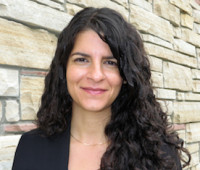Associate Professor
About
Website:
http://www.lynnbadia.comRole:
FacultyPosition:
- Associate Professor
Concentration:
- Literature
Department:
- English, English Grad, and English Undergrad
Education:
- B.A., English, Pomona College
- Ph.D., English and Comparative Literature, University of North Carolina, Chapel Hill.
Biography
Dr. Lynn Badia is an Associate Professor of English at Colorado State University, and she is affiliated faculty of the CSU Energy Institute and the CSU Center for Environmental Justice. Dr. Badia works in the fields of science studies, literary studies, environmental humanities, and energy humanities. Her work is published by a range interdisciplinary venues, such as American Quarterly, Cultural Studies, Earth’s Future, Resilience: A Journal of Environmental Humanities, Open Library of the Humanities, and Nineteenth-Century Contexts among others.
In 2021, her co-authored publication in Earth’s Future—which argues that climate change science requires a transdisciplinary focus on social, technical, and justice issues—became the template for President Joe Biden’s $400 million dollar budget proposal to create a new national climate research agency.
Dr. Badia has given invited keynote presentations on scenario narratives, climate science, science fiction, energy transitions, and more-than-human communities at a range of institutions, such as Princeton University’s Andlinger Center for Energy and the Environment; the U.S. National Academies of Sciences, Engineering, and Medicine; the U.S. Department of Energy; Dartmouth University’s Arthur L. Irving Institute for Energy and Society; and the University of Cambridge Centre for Research in the Arts, Humanities and Social Sciences (CRASSH), along with other invited talks including those at Yale University’s Energy Humanities Workshop, Dartmouth College’s inaugural Energy Humanities Symposium, and Rice University’s Cultures of Energy Symposium.
Publications
SELECT/RECENT PUBLICATIONS
Books
Lynn Badia, Marija Cetinić, and Jeff Diamanti, 2020, Climate Realism: The Aesthetics of Weather, Climate, and Atmosphere in the Anthropocene. Routledge.
Imre Szeman and the Petrocultures Research Group, 2016, After Oil, West Virginia University Press.
Special Issues
Editors Lynn Badia, Marija Cetinić, and Jeff Diamanti 2020, “Climate Realism: The Aesthetics of Weather, Climate, and Atmosphere.” Resilience: A Journal of the Environmental Humanities, Vol. 7, No. 2-3. (Double special issue)
Articles, Chapters, White Papers
Patrick W. Keys, Lynn Badia, and Rekha Warrier, 2023, “The Future in Anthropocene Science.” Preprint available via Earth ArXiv: https://eartharxiv.org/repository/view/5413/
Lynn Badia, 2022, “Energy Humanities,” In: Palgrave Handbook of Critical Posthumanism, (Eds. Stefan Herbrechter, Ivan Callus, Manuela Rossini, Marija Grech, Megen de Bruin-Molé, Christopher John Müller) Palgrave Macmillan.
Lynn Badia, Josette M. Plaut, Joseph C. von Fischer, John Volckens, and Jeff Muhs, 2021, “Envisioning ARPA-C: A Transdisciplinary Institute for Radical Climate Research and Intervention.” Earth’s Future, Vol. 9, No. 6, https://doi.org/10.1029/2021EF002115
Lynn Badia, 2020, “The Nation as Energy: Imagining Society as Energy Intensity,” American Quarterly, Vol. 72, No.3, pp. 771-795.
Lynn Badia, Marija Cetinić, and Jeff Diamanti, 2020, “Climate Realism: The Aesthetics of Weather, Climate, and Atmosphere in the Anthropocene.” Resilience: A Journal of the Environmental Humanities Vol. 7, No. 2-3, pp. 1-12
Lynn Badia, 2019, “Absolute Indeterminacy: Karel Čapek’s Pragmatist Science Fiction,” Open Library of the Humanities, Vol. 5, No. 1, DOI: http://doi.org/10.16995/olh.130
Lynn Badia, 2019, Review of Climate Change and the Contemporary Novel by Adeline Johns-Putra, Cambridge University Press, Studies in the Novel, Vol. 52, No.1, pp: 98-100.
Lynn Badia, Josette M. Plaut, Joseph C. von Fischer, John Volckens, Jeff Muhs, 2019, “Envisioning ARPA-C: A Transdisciplinary Institution for Radical Climate Research and Intervention.” White paper proposal submitted to and adopted by President Joe Biden for his climate research agenda and given a $400 million line in his 2021 budget proposal.
Lynn Badia, 2016, “Émile Durkheim’s Theory of Culture as Force and Energy,” Cultural Studies, Vol. 30, No. 6, pp. 969-1000.
Lynn Badia, 2016, “’A Transcendentalism in Mechanics’: Henry David Thoreau’s Critique of a Free Energy Utopia,” In: Nineteenth-Century Energies: Literature, Technology, Culture (Ed. Lynn Voskuil), Routledge, pp. 17-32.
COURSES AT CSU
Education Abroad Program: E404: "Sustainable Energy Futures in Denmark" (Graduate/Undergraduate) More information at http://www.lynnbadia.com/teaching.html
E636: Environmental Literature and Criticism (Graduate)
E635: Critical Studies in Literature and Criticism: “Deep Time: Narrating the Distant Past and Future” (Graduate)
E630: Special Topics in Literature: “Hackles Raised: On Being Close to Animals” (Graduate)
E600: Research Methods and Theory in Literary Scholarship (Graduate)
LB393: Interdisciplinary Liberal Arts: "Cultural Extraction: Energy in the Humanities" (Undergraduate)
E370: American Literature in Cultural Contexts: “Climate Fiction” (Undergraduate)
E456: Topics in Critical Theory: “Posthumanism: Literature and Philosophy of the Non-Human: Plants, Animals, & Minerals”
E340: Literature and Film Studies (Undergraduate)
E339: Literature of the Earth (Undergraduate)
E333: Critical Studies of Popular Texts: "Science Fiction" (Undergraduate)
